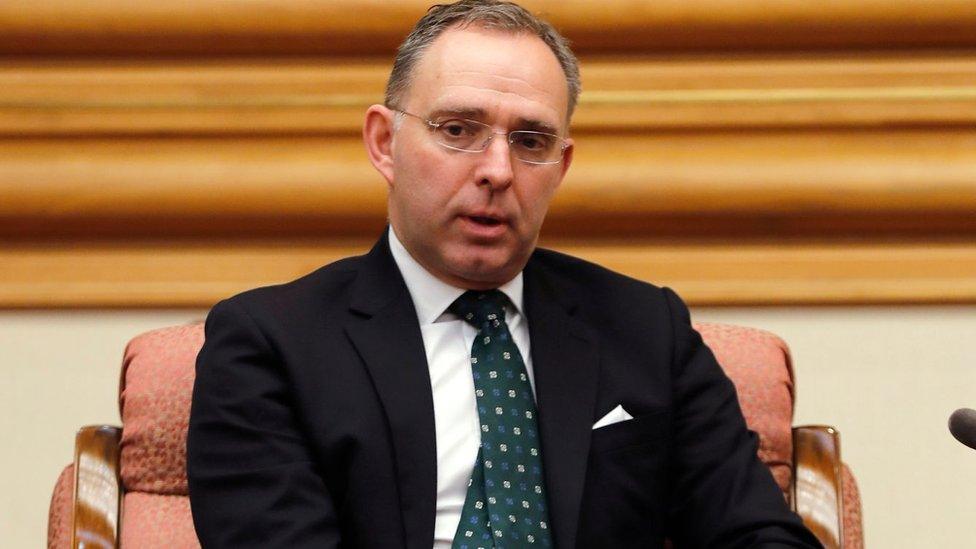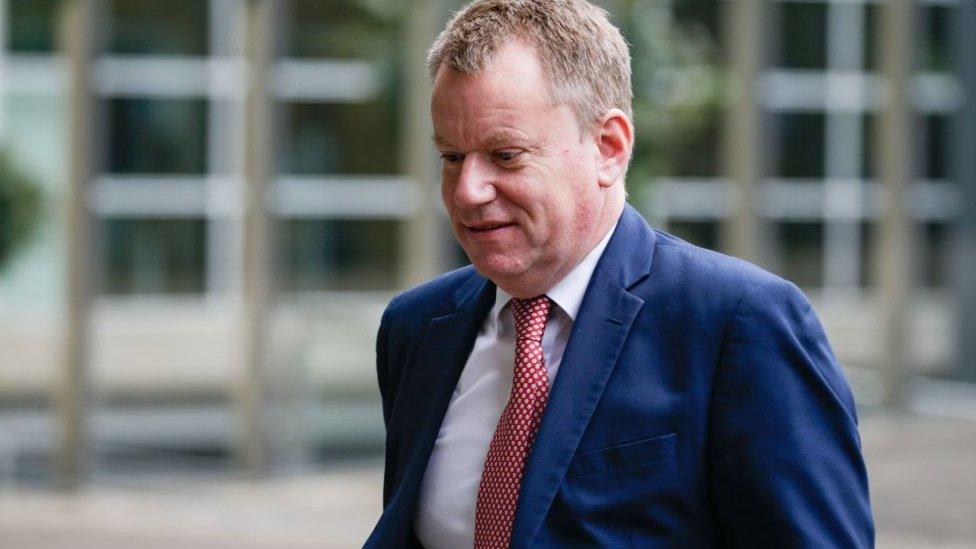Mark Sedwill: Top civil servant 'wanted to move on' says PM
- Published

Sir Mark said it had been a privilege to have served in "extraordinary times"
Boris Johnson has dismissed criticism of the departure of the UK's top civil servant, saying the timing of Sir Mark Sedwill's exit was "very logical".
Labour have said the PM should focus on the economic crisis facing the country rather than "moving out" top officials.
Sir Keir Starmer said the decision showed the PM had the wrong priorities.
But the PM said Sir Mark "wanted to move on" and now was a sensible time since he had seen the UK through "the most difficult part" of the pandemic.
"Mark has done a huge amount," he said on a visit to west London. "He did a change of premiership, did Brexit, he's managed the country though the most difficult part of the coronavirus crisis."
Sir Mark is to stand down as the UK's top civil servant in September and will also relinquish his role as national security adviser to the prime minister.
The PM's chief Brexit negotiator David Frost, who is not a civil servant, will take over as national security adviser. It has been criticised by Lord O'Donnell, who was a top adviser to Tony Blair, Gordon Brown and David Cameron.
And unions have hit out at what they said were "corrosive and cowardly" briefings against Sir Mark in the press, which suggested tensions between him and the PM's political advisers.
The Labour leader suggested Sir Mark's exit - the latest in a number of top civil servants to stand down since the general election - was badly timed given the UK was in the middle of a health and economic emergency.
"I think it's a question of priorities," he told Radio 4's Today. "We've got an economic crisis just around the corner and what does the prime minister do? He starts moving the cabinet secretary out of his post.

David Frost will become national security adviser when the EU trade talks are completed
"Focus on the economic crisis, start preparing a budget, this is a question of priorities."
Sir Mark was handpicked by Theresa May to be cabinet secretary - a role in which he advises on the implementation of policy and conduct of government - Sir Jeremy Heyward's death in November 2018.
Ministers have said the process for choosing his successor will be thorough, with senior civil servants currently running departments or with experience of doing so encouraged to apply.
Potential candidates include Simon Case, recently appointed permanent secretary within No 10, Alex Chisholm, the Civil Service's chief operating officer and Antonia Romeo, who runs the Department for International Trade.
The PM played down reports that he wanted a staunch Brexiteer in the role.
"The great thing about the civil service is that nobody should know, least of all me," he said. "They are impartial, they are the best in the world. Who knows what his or her views will be?"
'Yes men'
Lord O'Donnell said he would have preferred Sir Mark to have stayed in post and he was worried about the choice of Mr Frost to be national security adviser given he had largely specialised in trade issues during his years in the Foreign Office and while working in the private sector.
"I am not quite sure how putting a special adviser in that role works and how that is consistent with Michael Gove's desire for deep subject knowledge," he told Radio 4's Today.
The appointment, one which in the past has tended to be filled by career diplomats, was a "clear example" of the independence of the civil service being eroded, he added.
"Political appointees are more likely to be subject to group think, more likely to be yes men, are more likely to say what it is ministers want to hear are opposed to speaking truth to power which is what it is all about."
But Education Secretary Gavin Williamson said Mr Frost had a record of "impeccable public service" and the goal was always to find the best person for the job.